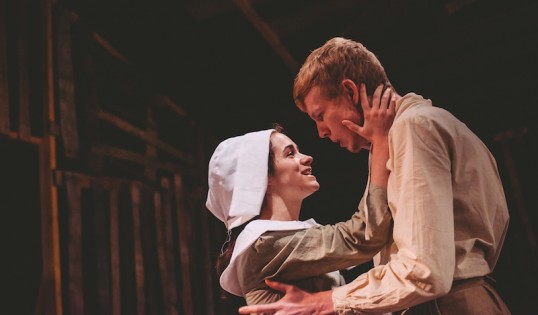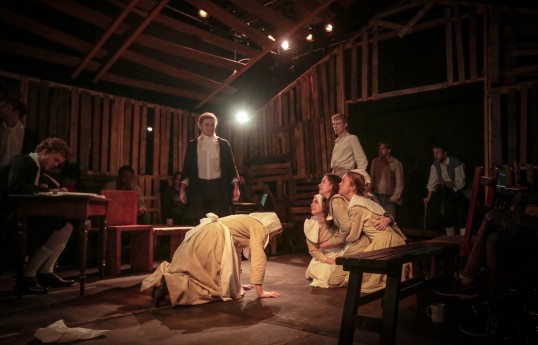The Crucible
★★★☆☆ Intimate
Bedlam Theatre: Tue 10 – Sat 14 Nov 2014
Review by Thom Dibdin
The passion and brutality at the heart of Arthur Miller’s The Crucible are brought out in an intense production at the Bedlam which strives just a bit too hard for authenticity.
EUTC go right back to basics for this immersive production staged in what is described as an authentic 1600s barn, built inside the theatre. The audience are crammed in, pushing out from three walls with the playing area thrusting out between two front rows.
It is a strong concept from Director Elske Waite and her production designer Harriet Visick. As if the audience are bearing witness to the Salem witch trials of 1692, seeing first hand the young girls accusing the farmers and townspeople of witchcraft -in reality covering up their own misdemeanour of being caught dancing in the woods.
It gives a tangible feel to the whole production. You can smell the stew served to upright but flawed John Procter by the wife he loves – but who he betrayed with their erstwhile servant, Abigail. Feel the thud as Abigail falls to the floor in the first trial scene, allegedly under a glamour from those she accuses.
And it makes sense, then, for Waite to focus in on the central emotional conflict which drives the whole sorry business: the relationship between Douglas Clark’s bewildered John Proctor and Sasha Briggs’ manipulative, pokerfaced Abigail.
Their moment alone on stage is as fraught with emotion as they come. If this were prose, it would be purple and there would certainly be cupping. Procter is clearly the intellectual inferior of a young woman who is intent on manipulating her own advancement – whether in his barn or in the courtroom.
close to the action
The problem with such a flare of emotion is that it can obscure that which is around it: The grind of daily life in Salem; the niceties of the relationship between George Prove’s self-interested Reverend Paris and his parishioners; and the other cases of self-interest which drive those who seek to profit from the outcome of the trials and death of their neighbours.
It isn’t helped that the staging which brings its audience so close to the action also keeps them away from it. Anyone not in the front rows is lucky if they can actually see a third of what is happening. Of course Miller works well enough on the radio, but few of the performers have the clarity of delivery to be able to rely solely on their vocal delivery.
One who does is Benjy Gibson who excels as the supercilious, driven Deputy-Governor Danforth. There is a heart of stone to his characterisation, a self belief which is all too evident in the second half courtroom scenes.
Here is a man who is quite capable of believing his own twisted logic. He is so besotted with the one central idea of a devil on earth – who is making witches of all who behold him and from whom no person is immune – that he clearly believes that any who dare voice doubt in his purity of purpose must themselves be in league with the devil.
It is a chilling realisation. A view of inevitable destruction of the human beings, the fallible individuals who have become caught up in this trial.
self-serving logics
In many ways, it provides the audience with the necessary blank canvas on which to imagine this self-fulfilling trial in other circumstances. Miller was creating his own parallels with the American anti-communist witch trials of McCarthyism, but there are other self-serving logics which you could draw parallels with, if you wished.
If only such a clarity were extended throughout the cast. The older female characters are generally excellent – Celeste MacIlwaine as Rebecca Nurse and Alice Markey as Elizabeth Proctor both stand out – but the older male characters suffer from a slip into caricature.
Which wouldn’t matter too much, except that it means that many of the nuances of the text are lost. It is not helped that Clark’s Proctor just peaks too soon. His emotional pitch goes straight up to 11 almost from the start, and he has nowhere else to go.
It makes for more stunning emotion in the final resolution between John and Elizabeth Proctor, when both know they are condemned to die. But there is so much more there which is overshadowed by this emotion – not least the news of the death by pressing of Giles Corey does not carry the punch that it can.
A strong, interesting production which pushes the boundaries in one direction but which does so at the expense of other elements of one of the greatest scripts American theatre.
Running time 2 hours 25 minutes (with one interval)
Bedlam Theatre, 11 Bristo Place,, EH1 1EZ
Tuesday 10 – Saturday 14 November 2015
Evenings 7.30 pm
Details and tickets from: https://www.bedlamtheatre.co.uk/shows/the-crucible-2015
ENDS



















